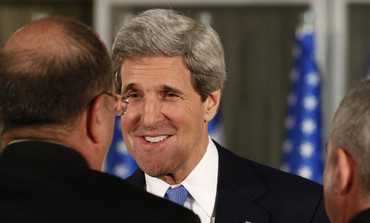What was John Kerry thinking when he asked Turkey’s anti-Jewish prime minister to be “a partner”?

That means persuading his friend Khaled Mashaal, Hamas’ leader, to do everything he and his organization have sworn they never would do: recognize Israel’s right to exist, renounce armed struggle and abide by all Israeli- Palestinian agreements.
Most NATO and European countries – except Turkey – consider Hamas, which seized control of the Gaza strip in a bloody 2007 coup, a terrorist organization.
Erdogan’s inclusion is bad news for Egypt, Fatah and Israel. Egypt resents Turkey moving on to its turf. Former Egyptian president Hosni Mubarak felt he had a monopoly as the regional intermediary and told Erdogan to keep his hands off; his successor, Mohamed Morsi, apparently feels that way as well, plus now it’s an Islamist as well as national rivalry.
Palestinian Authority President Mahmoud Abbas knows Erdogan is a close ally of arch-rival Hamas and hostile to the secular nationalist Fatah. If anything, Erdogan is more radical than Abbas, and that’s the last thing the PA leader needs. Relations between the two men are said to be cool at best. Abbas also knows Hamas wants to overthrow him and take over not only the PA but control of the PLO as well.
There are few people who Israelis distrust more than Erdogan. Bringing him in is no way to win their confidence.
Two senior cabinet ministers have already rejected any suggestion of a Turkish role, recalling Israel’s unhappy experience with Erdogan in 2008 when he tried to mediate with Syria, then his close ally, and acted more like Bashar Assad’s advocate.
It has been suggested that a more appropriate mediator would be King Abdullah II of Jordan, who is on good terms with both the Israelis and Palestinians. He is scheduled to visit President Barack Obama later this month and is said to be eager to play a role in any peace process.
One reason for Kerry’s unexpected stop in Ankara on his second trip to the region in two weeks was concern that Turkey was backtracking on its promise to normalize relations with Israel following Prime Minister Binyamin Netanyahu’s apology to Erdogan in connection with the Mavi Marmara flotilla incident that led to a rupture in relations between the two former allies.
Kerry told Turkish leaders he’d like Ankara to make good on its promise to quickly reach agreement on compensation and return its ambassador to Israel, but new Turkish demands and Erdogan’s triumphalist boasting have raised doubts in Jerusalem and Washington about Turkish intentions.
The latest setback is Turkish insistence that “all of the embargoes should be eliminated once and for all,” meaning Israel’s blockade of Gaza, before diplomats can be exchanged, although that was not part of the reconciliation brokered by President Obama. In his press conference with Kerry Foreign Minister Ahmet Davutoglu repeatedly called for Israel “going back to 1967 borders.”
Speaking of borders, Abbas has a new precondition for resuming negotiations with Israel. He is demanding Netanyahu announce acceptance of the 1967 lines as the basis for negotiations and present a map detailing Israel’s position on borders. Israel objects, saying that would give away its bargaining position and provide the Palestinian with a starting point for negotiations. Besides, Israel’s positions would depend on what kind of state is agreed to, the extent of demilitarization, security arrangements, the Arab uprisings in the region and other factors.
The demand for the map came with a threat. “If Kerry fails” to get Israel to hand it over in approximately two months, “we will start moving toward the international organizations” and file complaints against Israel in the International Criminal Court, said Palestinian Foreign Affairs Minister Riad al-Maliki.
And if Israel does all Abbas demands, would he resume negotiations? Maybe, said his chief negotiator, Saeb Erekat. Meeting those terms “could lead to an immediate resumption of talks.”
Abbas told the Globe and Mail this week, “I think there was some opportunities [for peace] in the past, but unfortunately we missed these opportunities.”
He complained that time is running out for a two-state solution yet he continues to refuse to resume negotiations.
Instead he keeps upping the ante by adding new preconditions for talks. Now it is the map, before that it was the release of prisoners and before that a total construction freeze beyond the 1967 lines, including in east Jerusalem.
The logical conclusion is that he simply isn’t interested.
He may talk about peace but he keeps finding excuses not to talk.
President Obama has told Abbas, and Kerry repeated the message this week, that Washington backs Netanyahu’s call for resuming talks without any preconditions.
Critics say Netanyahu, who has failed to contradict key ministers who openly oppose the two-state solution and keeps expanding settlements, isn’t any more interested in returning to the peace table than Abbas, but Palestinians are clearly afraid to call his bluff.
Kerry would reportedly like to revive and revise the 2002 Arab peace initiative, which Israel rejected at the time and the Arabs did nothing serious to convince them otherwise. Much has changed in the region over the past decade, and Kerry’s challenge will be to convince all sides they will need to show much greater flexibility if they are serious about doing more than missing opportunities.
The big question is whether the United States is the only one that wants peace badly enough to devote more than empty rhetoric to the cause. Despite the flurry of diplomacy at Foggy Bottom, it’s far from clear whether the Israelis and Palestinians themselves are ready to work with the new secretary of state.




